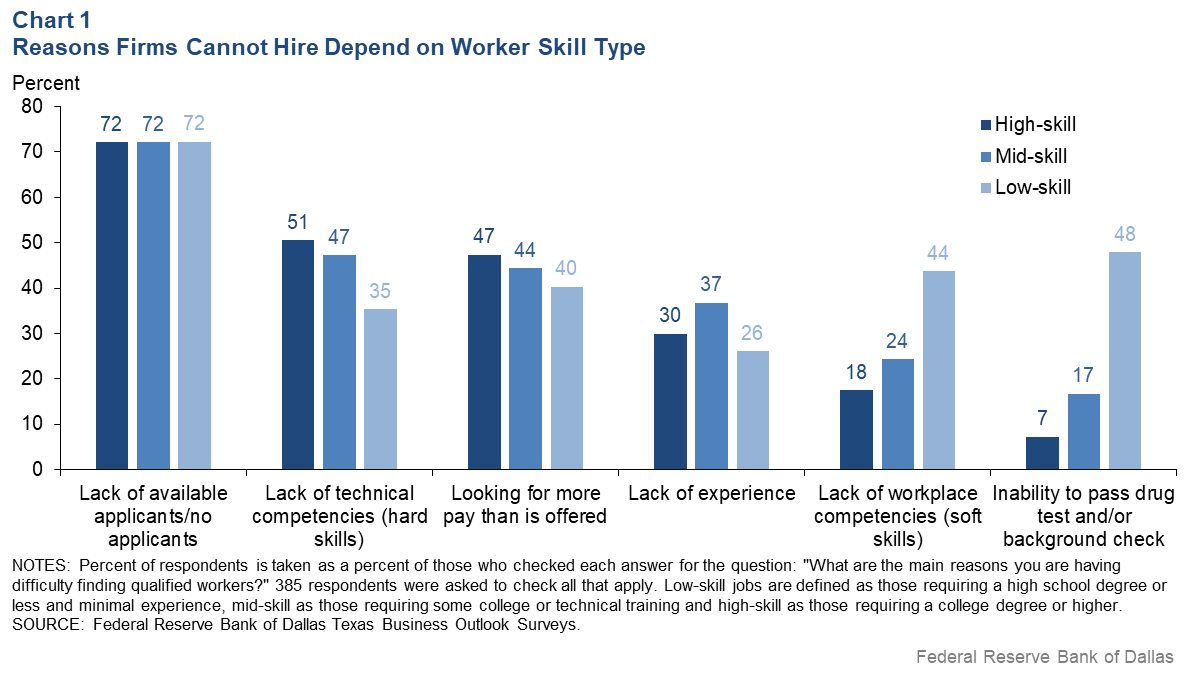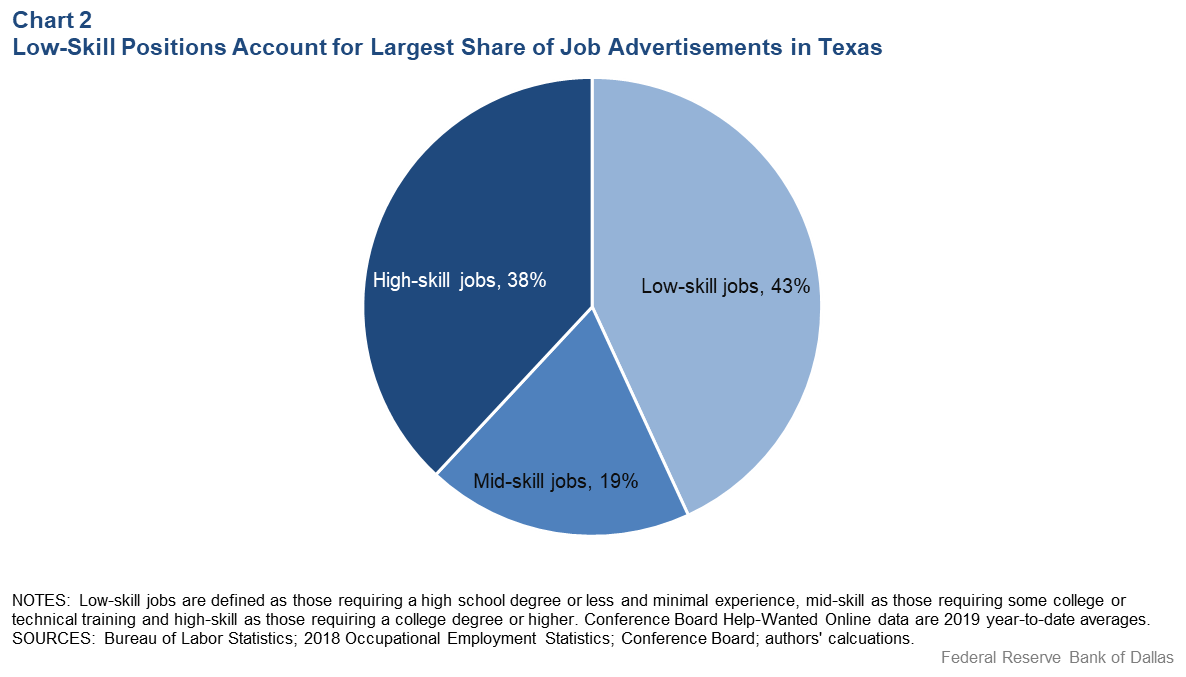
Failed background check, drug testing stall hiring of low-skilled workers
The Texas labor market remains unusually tight, with the unemployment rate hovering at an all-time low of 3.4 percent. Many companies seek to add employees as the state economy continues expanding at an above-average pace. But not all can find the workers they need.
About 70 percent of firms are trying to hire, with three-fourths of them encountering difficulties finding qualified workers, according to a survey of Texas businesses conducted by the Dallas Fed in August. Among firms trying to hire low-skill workers, nearly half of respondent firms reported an inability among low-skilled applicants to pass a drug test and/or background check.
The Dallas Fed’s Texas Business Outlook Surveys (TBOS) took a closer look at labor shortages by skill level and the reasons underlying the hiring difficulty. Across all skill levels, there is a lack of applicants. Not surprisingly, firms cite wage pressure and lack of skill or experience as common reasons for labor scarcity (Chart 1).

This is especially true for mid-skill positions (requiring some college or technical training) and high-skill jobs (requiring a college degree). About half of firms looking to fill these positions reported that applicants lacked the prerequisite technical skills needed to perform job-related tasks. Nearly half of respondents also reported that applicants sought more pay than they were able or willing to offer.
Low-skill hiring faces unique challenges
Separately, the Dallas Fed’s Small Business Credit Survey in 2018 found that among Texas small businesses looking for non-college-degreed workers, 25 percent cited applicants having difficulty passing background/credit checks, and 24 percent cited applicant problems passing a drug test.
Among TBOS respondents, about 44 percent reported a lack of soft skills or workplace competencies as another challenge in finding low-skill workers. In particular, firms noted that the labor pool lacked a work ethic, reliability and communications skills.
By comparison, only a relatively small share of firms looking for mid- or high-skilled workers cited issues with applicants lacking general soft skills needed to navigate a workplace environment or an inability to pass preemployment screenings.
This has significant implications for job growth in the state. Conference Board data on online help-wanted advertising by occupation and Bureau of Labor Statistics figures on minimum education and work experience requirements indicate that more than 40 percent of Texas job postings in 2019 have been for low-skilled positions (Chart 2). This suggests that a worker shortage for these positions constitutes a major bottleneck, forcing firms to scale back expansion plans or invest more in labor-saving alternatives.

Background check impediment
Background check difficulties are not surprising given that FBI records show more than 70 million individuals as having been arrested or convicted of a crime, almost one-third of the U.S. adult population. One study estimated that about 8 percent of American adults have felony convictions. More than 10 million individuals are released annually from a jail or prison.
Meanwhile, increased marijuana access may be contributing to the large percent of job applicants’ failures to pass drug tests. The 2018 National Survey on Drug Use and Health found that 38.7 percent of Americans ages 18 to 25 used illicit drugs in the past year, and 16.7 percent of those age 26 or older. Illicit drugs include banned and misused drugs and substances.
About 20.3 million people age 12 or older had a substance use disorder related to alcohol or illicit drugs in the past year.
Not all employers disqualify job applicants with positive drug tests; however, some have a zero-tolerance policy. Prescription pain medication use has been found to depress labor participation of prime-age males (ages 18 to 54). In Texas, there were 53 opioid prescriptions for every 100 people, a lower rate than in the nation and the lowest for the state since 2006 when the data first became available, according to 2017 estimates by the Centers for Disease Control and Prevention.
Strategies to broaden labor pools
Although previous misconduct or substance use do not always correlate with future lapses and workplace disruption, both limit job access as preemployment screening has become more common. Background checks and drug tests can be a double-edged sword. While reducing risk for businesses to hire potentially harmful and untrustworthy workers, they can deny access to otherwise qualified applicants and may exacerbate labor shortages.
To improve the chance of reentry into the workforce among ex-convicts, 35 states and the District of Columbia as well as more than 150 municipalities have implemented “Ban the Box (BTB)” policies as of April 2019. During the initial application process, prospective workers are not required to check a box indicating whether they have been convicted of a felony. This defers a criminal history check until later in the hiring process, giving applicants a fuller opportunity to explain their histories.
A recent study found that BTB has increased the likelihood of public sector employment of ex-convicts by 30 percent. However, a pair of studies, among several others, found that BTB increased “statistical discrimination” against young, minority males. Without precise information on criminal records, some employers tend to increasingly rely on racial and gender stereotyping.
The Texas labor market remains tight, affecting a range of industries and skill levels. The inability to pass preemployment screening most affects low-skill hiring. Companies increasingly must weigh a trade-off when evaluating candidates adversely affected by the screening process—incurring greater hiring risks versus the possibility of achieving heightened firm productivity.
About the Authors
The views expressed are those of the authors and should not be attributed to the Federal Reserve Bank of Dallas or the Federal Reserve System.


